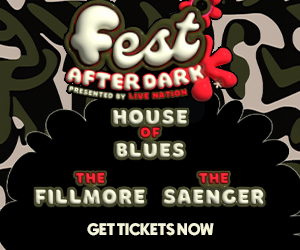A little cloud cover and a little breeze made Sunday much nicer than Saturday, which bordered on unpleasant because of the heat and crowds. I walked by Jake Smith (Acura Stage) playing sons-of-Dave-Matthews acoustic rock that was more engaging than his album, and E.O.E. (Congo Square) who impressed me with easy, worldly grooves and their rapper’s flow. I was interested in the drummer’s Spanish rapping as well, but his Latin beats left a little to be desired. Joe Hall and the Cane Cutters’ two fiddles and accordion attack also held my attention – all three subjects for further study. Wayne Toups, by the way, one-upped Joe Hall with three fiddlers onstage at one time.
On Friday, Christian Serpas’ gift for traditional country songs phrased with traditional cleverness were engaging. Sunday, songwriter Jim McCormick performed the modern incarnation of those songs – still defined by a turn of the phrase or a play on words, but with a note of suburban, middle class nostalgia that is strong in country music these days. After McCormick played “Louisiana,” it was hard to believe that Tim McGraw’s version didn’t become a hit.
Surprise of the day was Kinky, the Mexican tech-savvy dance rock band that pointed a possible direction for New Orleans bands willing to see it. They never sold out their culture, but they weren’t limited by it either, making modern music with modern tools. Their version of “Mexican Radio” interacted with Wall of Voodoo’s recording, with singer Gil Cerezo swapping verses with the pre-recorded Stan Ridgway. Their dynamics came from old school hip-hop, and the bass throb is straight out of British rave pop. In a city as culturally complex as New Orleans, it’s exciting to imagine a contemporary music that reflects its present as much as its past.
Wandered. A little Better Than Ezra, New Orleans R&B All-Star Revue, Pine Leaf Boys. Nothing new or special to say about any of them, particularly after seeing the Avett Brothers. They were the weekend’s other revelation (with Kinky) as they played folk without the usual folk music piety. Nothing suggested that they saw what they did as something purer or more beautiful than anything else, or that it was a higher, more sincere, more sacred music. That meant that humor and sober reflection were on equal footing, and the lovely moments were privileged over the times when they made perfectly good guitars sound like they cost $45 at Toys R Us. And when folk singers inadvertently make themselves sound like each other in a host of ways, the Avetts made their personality their calling card, letting their playing, their words and their voices be distinctive and unique to them.
It was interesting to see how many people were excited to see the Dave Matthews Band, but how few visual signs of enthusiasm there were. For the middle hour, there was little dancing, few fists in the air and minimal grooving. People were happy to be there, but it wasn’t obvious why.




